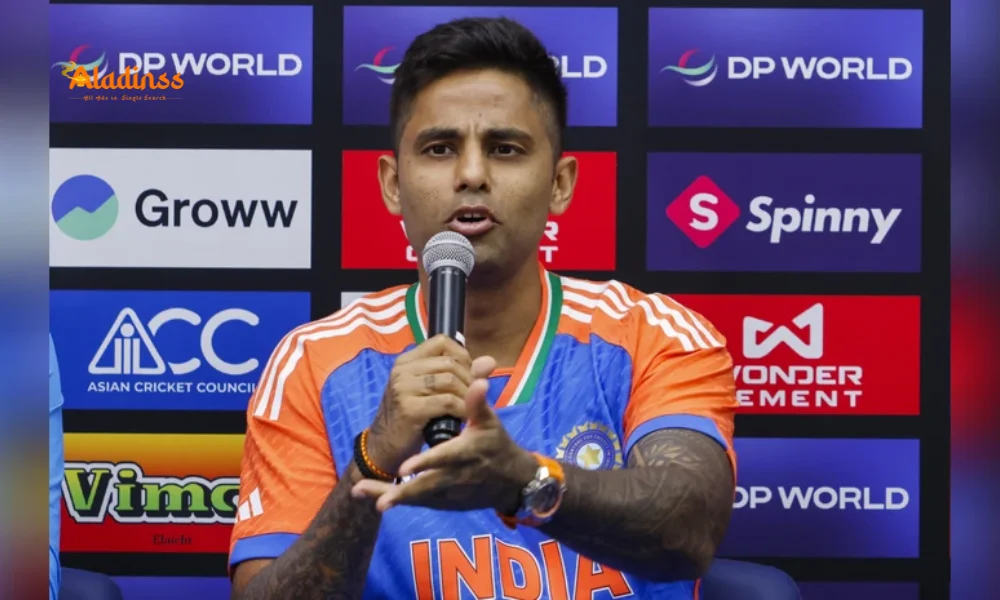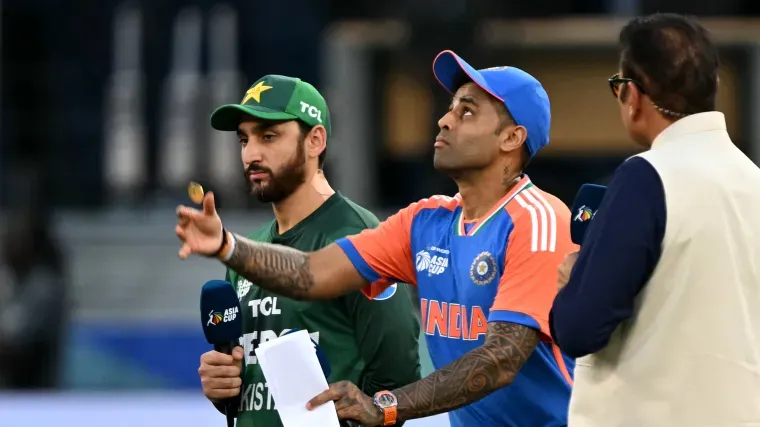Suryakumar Yadav Defends No Handshake Stance After India's Asia Cup Win Over Pakistan

Suryakumar Yadav Defends No Handshake Stance After India's Asia Cup Win Over Pakistan

In a charged atmosphere at the Dubai International Cricket Stadium on September 14, 2025, India’s T20I captain Suryakumar Yadav dedicated his team’s emphatic seven-wicket victory over Pakistan in the Asia Cup league stage to the Indian armed forces, emphasizing that “some things are beyond sportsmanship.” The decision by the Indian cricket team to forego the customary post-match handshake with their Pakistani counterparts has sparked widespread discussion, trending on Google with keywords like “India vs Pakistan Asia Cup 2025” and “Suryakumar Yadav no handshake update,” as well as on X with hashtags such as #AsiaCup2025 and #IndiaVsPakistan. The move, backed by the Board of Control for Cricket in India (BCCI) and a key support staff member, was a response to heightened geopolitical tensions following the Pahalgam terror attack in April and India’s “Operation Sindoor” in May.
Suryakumar, speaking at the post-match press conference, defended the team’s stance, stating, “We took a team call. We had come only to play. We had given them a reply. Some things are beyond sportsmanship. We dedicate this victory to our armed forces who took part in ‘Operation Sindoor’ and stand with families of the victims of the Pahalgam terror attack.” The victory, which saw India chase down Pakistan’s modest total of 127/9 in just 16.3 overs, was marked by a tense conclusion as the Indian players, led by Suryakumar, chose not to engage in the traditional handshake, even as the Pakistani team waited in line after the match.
The Match: India’s Dominant Performance
The match itself was a clinical display of India’s prowess in T20 cricket. Pakistan, batting first, struggled against India’s spin-heavy bowling attack. Spinners Axar Patel (2/18 in 4 overs), Kuldeep Yadav (3/18 in 4 overs), and Varun Chakravarthy (1/24 in 4 overs) were relentless, exploiting the sluggish Dubai pitch to restrict Pakistan to a below-par 127/9. None of the Pakistani batters could decipher the spin trio’s variations, with misjudged shots and poor footwork leading to their downfall. The total was at least 50 runs short of a competitive score, setting the stage for India’s comfortable chase.
India’s batting response was led by Suryakumar Yadav himself, who sealed the victory with a towering six, finishing unbeaten on a brisk 45 off 28 balls. The chase was anchored by contributions from the top order, with the team reaching the target with 21 balls to spare. The near-capacity crowd, with 85% Indian fans, erupted in celebration, their fervor reflecting the high stakes of the India-Pakistan rivalry. The match, however, was overshadowed by the post-game controversy, as the absence of a handshake became a focal point of discussion on social media and news outlets.
Geopolitical Context: The Pahalgam Attack and Operation Sindoor
The decision to skip the handshake was rooted in the broader context of India-Pakistan relations, particularly following the Pahalgam terror attack in April 2025. The attack, which targeted civilians and security personnel in the Jammu and Kashmir region, resulted in significant loss of life and heightened tensions between the two nations. In response, India launched “Operation Sindoor” in May, targeting terrorist bases across the border. The operation, executed by the Indian armed forces, was widely supported domestically but further strained diplomatic ties with Pakistan.
The Asia Cup match, held just months after these events, was fraught with political undertones. Calls for a boycott had emerged from various quarters in India, with some arguing that participating in the tournament alongside Pakistan was inappropriate given the recent violence. Despite these sentiments, the BCCI and the Indian government opted to proceed with the match, viewing it as an opportunity to demonstrate national strength on an international stage. Suryakumar’s comments at the press conference underscored this alignment, as he stated, “We are aligned with our government and the BCCI.” The decision to forego the handshake was a deliberate gesture, reflecting the team’s solidarity with the armed forces and the victims of the Pahalgam attack.
The Handshake Controversy: A Break from Tradition
The absence of a handshake, both at the toss and after the match, marked a significant departure from cricket’s tradition of sportsmanship. Typically, India-Pakistan matches, despite their intense rivalry, conclude with players from both sides exchanging pleasantries. However, on this occasion, the Indian team’s decision was premeditated, with a key support staff member and the BCCI endorsing the move. The Pakistani players, expecting the customary gesture, were left waiting on the field, adding to the tension of the moment.
The incident quickly became a trending topic on X, with hashtags like #NoHandshake and #IndiaVsPakistan2025 gaining traction. Opinions were divided, with some fans praising the Indian team for taking a stand, while others criticized the move as unsportsmanlike. Cricket analysts noted that the decision was likely influenced by the broader socio-political climate, with the team aiming to send a message beyond the cricket field. The controversy has also sparked debates about the role of sports in diplomacy, with many questioning whether such gestures risk escalating tensions further.
Fan Reactions and the Atmosphere in Dubai
The Dubai International Cricket Stadium was electric, with a near-capacity crowd dominated by Indian supporters. The 85% Indian fanbase created a vibrant atmosphere, chanting slogans and waving flags throughout the match. The victory, sealed by Suryakumar’s six, was met with roaring applause, but the post-match scene shifted focus to the handshake controversy. Social media platforms, particularly X, were flooded with reactions, with fans expressing pride in the team’s performance and support for their stance on the handshake issue.
The Indian diaspora in the UAE, a significant portion of the crowd, viewed the victory as a moment of national pride, especially given the dedication to the armed forces. Posts on X highlighted the emotional weight of the win, with users sharing clips of Suryakumar’s press conference and the team’s dominant performance. Google Trends data showed a surge in searches for “Asia Cup 2025 India vs Pakistan” and “Suryakumar Yadav press conference,” reflecting the global interest in the match and its aftermath.
Implications for Cricket and Beyond
The no-handshake stance has raised questions about the future of India-Pakistan cricket encounters, which are already rare due to political tensions. The Asia Cup, hosted in a neutral venue like Dubai, provided a platform for the two teams to compete, but the incident may influence how future matches are approached. The BCCI’s support for the team’s decision suggests a shift in how India navigates these high-stakes encounters, prioritizing national sentiment over traditional cricketing norms.
The match also highlighted the exceptional form of India’s spin bowling unit, with Axar Patel, Kuldeep Yadav, and Varun Chakravarthy emerging as key players in the T20 format. Their ability to dismantle Pakistan’s batting lineup underscored India’s depth in spin bowling, a factor that will be crucial as the tournament progresses. For Pakistan, the loss exposed vulnerabilities in their batting, particularly against quality spin, prompting discussions about their strategy moving forward.
As the Asia Cup continues, the focus will remain on India’s campaign and the broader implications of their stance. The team’s dedication to the armed forces and the victims of the Pahalgam attack has resonated deeply with fans, reinforcing the idea that sports can serve as a platform for broader messages. The controversy, while divisive, has ensured that the match remains a talking point, with ongoing discussions on X and Google Trends tracking the latest developments in this high-profile cricketing saga.
Comment / Reply From
No comments yet. Be the first to comment!








